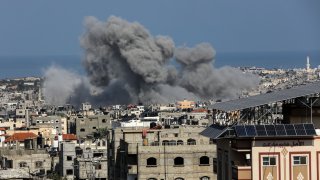Western NGOs Helped Radicalize Palestine, Now They Can Help Deradicalize It
It should be a matter of public interest which NGOs are chosen to help rebuild Palestine, what they spend money on, and whom they work with.
As the war in Gaza stretches into its fourth month, speculation is growing regarding the future of the battered coastal enclave. This includes concerns about who will rule Gaza, rebuild its infrastructure, and re-establish its economy while ensuring Israel’s security. To have long-term success in Gaza and the West Bank, a severe conceptual recalibration must take place that emphasizes deradicalizing Palestinian society.
Gaza will need substantial financial help; and it will arrive, as it has since the 1990s, in the form of foreign aid via local and international Non-Governmental Organizations (NGOs) funded by numerous national governments and private donors. Thus, the global aid community needs to work toward a Palestinian society not focused on anti-Israel sentiments.
Since 1993, when parts of the West Bank and Gaza were put under limited Palestinian self-rule through the Oslo Accords, an estimated $40 billion in international aid has flowed to the region. However, instead of deradicalizing and democratizing, Palestinian society grew increasingly extreme, with its leaders supporting deadly terrorism against Israel. In a public opinion poll conducted by the Palestinian Center for Policy Survey and Research (PCPSR), three out of four Palestinians said the attacks of October 7, where Hamas terrorists murdered more than 1,200 Israelis, mainly civilians, and took more than 200 hostages, were justified.
While Hamas physically diverted a portion of the international aid to build rockets and tunnels, much of the aid went to the broader NGO community, which normalized antisemitism and fostered bias, hate, and incitement. Mustafa Barghouti, president of the Palestinian Medical Relief Society (PMRS), which received up to $5.5 million in funding between 2020-2023 from the European Union, its member states, and other NGOs, glorified the attack, calling October 7 “a glorious day for the Palestinian resistance and people.” On October 10, a senior employee for the most significant Palestinian human rights NGO Al-Haq, Ziad Hmaidan, openly incited violence in a Facebook post calling for jihad in southern Israel.
Following the attacks of October 7, governments worldwide temporarily halted aid to the Palestinians pending a review. The European Union, the single largest donor to Palestinians, put two NGO projects totaling €691 million under further scrutiny for reported incitement of violence and announced it would introduce additional anti-incitement requirements moving forward. Germany announced it would no longer support Al-Haq, while Switzerland halted three NGO projects. The Swedish government also sent its aid agency, the Swedish International Development Corporation (SIDA), to conduct an additional review after it failed to screen NGO social media for incitement and failure to condemn the Hamas massacre.
These investigations accurately diagnose the problem: existing policy mechanisms cannot detect or prevent aid from being diverted for hateful purposes. To solve this problem, the international community needs a detailed plan for vetting, delivering, conducting oversight, and ensuring accountability for these policies. However, donors must also strictly define the goals they seek to achieve and then communicate them clearly in their calls for proposals. Furthermore, to allow the vetting process for NGOs receiving aid to be more effective, it needs to be constricted, allowing fewer NGOs to receive assistance and preventing those who perpetuate hate from receiving it. The above-mentioned Palestinian NGO PMRS, which obliquely denied well-documented rape crimes committed on October 7, received a $438,765 grant in 2023 from the French government to “improve access to humanitarian care for Palestinian women.” However, vetting should also go beyond screening NGO activities and should include employees and contractors, both locally and internationally.
Overall, there should be a more hands-on approach to monitoring and tracking aid, a process that becomes even more complex in the case of non-monetary assistance (such as services and advocacy). Contracts with NGOs should include a clause requiring them to denounce terrorism, hate, and antisemitism—a policy already announced by the EU. It should be a matter of public interest which NGOs are chosen as partners, what they spend money on, and whom they work with. This is especially true when these NGOs are entrusted with sensitive work in conflict areas like Gaza and the West Bank.
If NGO funding is fully transparent and contracts include anti-incitement and ethical standards concerning employees and contractors, it will be easier for the international governmental donor community to hold them accountable. Furthermore, the policy recalibration of aid should include a detailed list of ramifications in case aid is abused, providing for canceling contracts, halting funding, or other sanctions for NGOs who abuse their funding. Private donors and foundations should do the same, creating a much-needed culture of responsibility in the international aid community.
Deradicalization of aid is just one piece in a very complex puzzle of what post-war Gaza will look like for Palestinians and Israelis alike. For the two to live peacefully side by side, Palestinian society will have to accept Israel’s legitimate existence, and deradicalization is the only way to get there. We are now at a crossroads. The international community can continue fueling anti-Israel hate, or it can leverage its immense potential to generate change and help create a more just, peaceful, and humane Palestinian society.
Olga Deutsch is the Vice President of NGO Monitor. Follow here on X @olga_deutsch.

